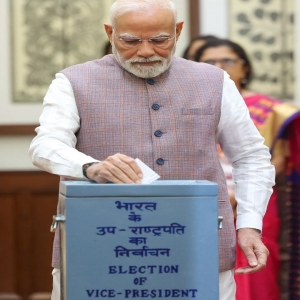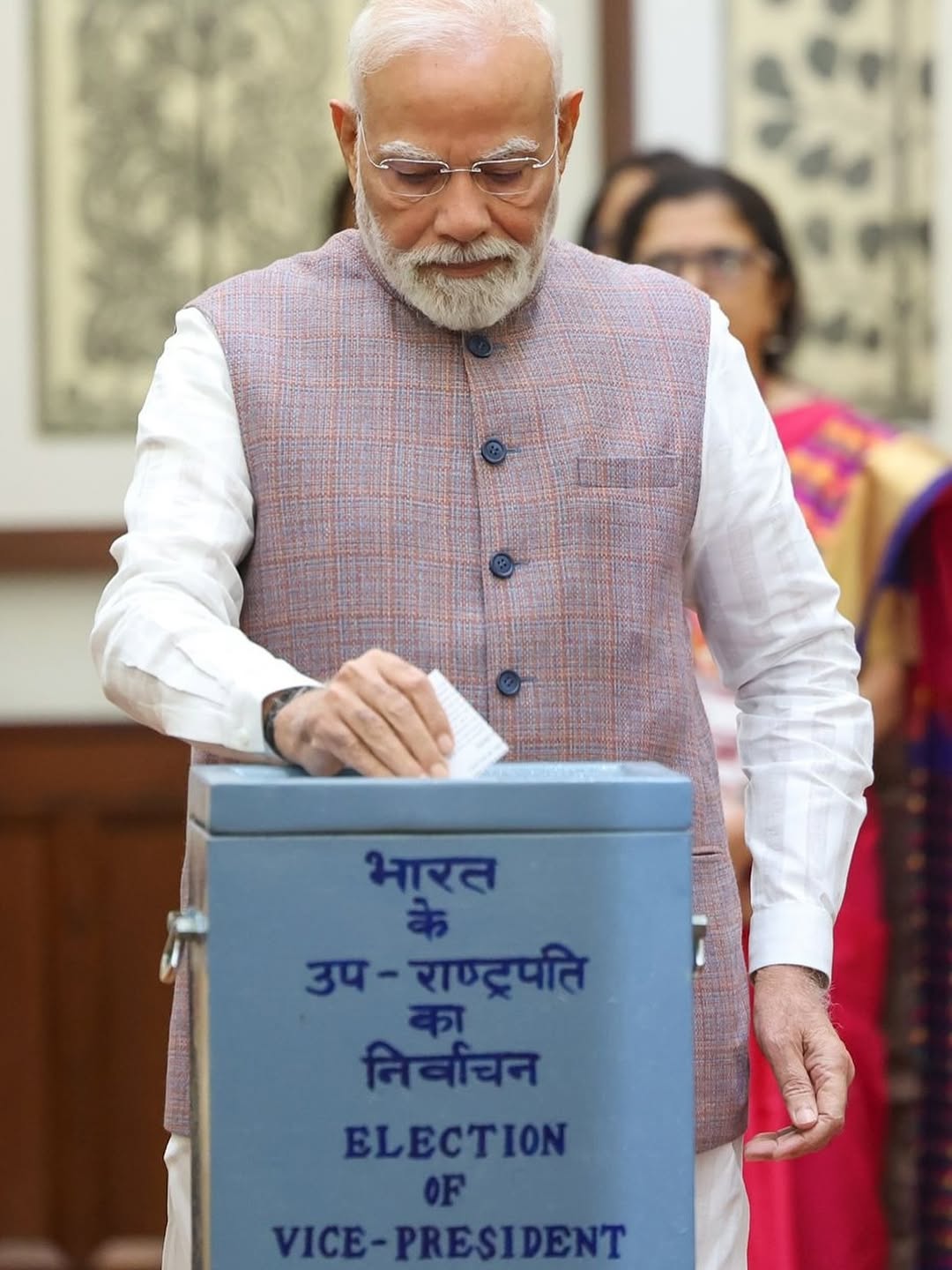
.png) M L Satyan
M L Satyan

The recently concluded Vice-Presidential election was considered a fight between two ideologies: "Upholding the Constitution and Democracy" by B. Sudharshan Reddy and the "Nationalistic ideology" (Hindutva/RSS ideology) by CP Radhakrishnan. We should note certain essential features in the two Vice-Presidential candidates:
1. Both candidates hailed from South India, giving the contest symbolic significance.
2. Radhakrishnan, from Tamil Nadu, has a long association with the RSS and administrative experience; the NDA pitched him.
3. Justice Reddy, from Telangana, was projected by the opposition as a legal expert to uphold constitutional values.
The straightforward appeal to the voters by Justice Reddy was: "Please vote by listening to your conscience". This appeal did make the ruling BJP nervous. The simple appeal by Justice Reddy raised the expectation of the common people. Most people believed that even the NDA MPs may have a 'conversion of heart' and support Justice Reddy. Everyone waited eagerly for the result.
The Electoral College for the Vice-Presidential election comprises a total of 788 members: 245 from the Rajya Sabha and 543 from the Lok Sabha. The 12 nominated members of the Rajya Sabha are also eligible to vote in the election. Party whips do not bind members of Parliament to vote in the Vice-Presidential election, which takes place under a secret ballot system.
What happened in this election? A total of 13 Members of Parliament abstained from voting. This list included seven from the Biju Janata Dal, four from the Bharat Rashtra Samithi, one from the Shiromani Akali Dal and one independent MP. Some MP seats are vacant. So, a total of 767 votes were cast. Out of these, 752 were declared valid and 15 were invalid.
Rajya Sabha Secretary General PC Mody, while speaking at a press conference, said, "NDA candidate and Governor of Maharashtra, CP Radhakrishnan, received 452 first-preference votes. He has been elected as the Vice President of India. The opposition's Vice-Presidential candidate, Justice Sudarshan Reddy, secured 300 first-preference votes."
The extent of the victory margin for the NDA candidate came as a setback to the opposition, which had claimed all its 315 MPs remained united in the election and voted for Reddy. Soon after the voting ended at 5 pm on September 9, Congress leader Jairam Ramesh said in a post on X that the opposition stood united. "All of its 315 MPs have turned up for voting. This is an unprecedented 100 per cent turnout."
Surprisingly and shockingly, Justice Reddy got only 300 votes. What happened to the other 15 votes? Many stories of cross-voting are emerging now. Some BJP leaders suggested that at least 15 opposition MPs voted in favour of Radhakrishnan. The ruling alliance also hinted that some opposition MPs deliberately cast invalid votes.
The BJP-led NDA had, on paper, 427 MPs in its alliance, with the YSR Congress also extending the support of its 11 MPs to its candidate. Some MPs representing smaller parties also backed Radhakrishnan. When NDA had the required number, why and how could cross-voting occur?
Last month, Rahul Gandhi presented evidence of vote theft to the people of India. The same strategies or modus operandi had been followed by the Election Commission to make the BJP candidates win. In all Assembly and Parliamentary elections, vote theft has occurred on a large scale. A similar vote theft strategy has also been employed in the VP election.
BJP succeeded in making its candidate win the election in the following ways:
1. Intimidation: The BJP threatened all NDA MPs with dire consequences if they failed to vote in favour of its candidate. The NDA MPs were under 'house arrest' till the election day and until the announcement of the result.
2. Abstaining: The three parties that abstained from voting were also under threat. They were told clearly: "Vote for the NDA candidate or abstain from voting." So, they chose the second option to safeguard themselves.
3. Horse-trading: How could 15 MPs from INDIA vanish suddenly? Were they responsible for invalid votes, or did they cross-vote? If they cross-voted, then this is clear evidence of horse-trading. This is also applicable to other parties/independent candidates who engaged in cross-voting for their own benefits.
4. Invalid votes: All the MPs were trained on the voting procedure. The Sansad TV also published an instruction on September 8 at 11:15 pm stating that MPs must use the same pen provided at the voting venue. Usage of any other pen will amount to an invalid vote. Despite the training and prior instruction, 15 MPs cast invalid votes. Is this not clear evidence of their irresponsibility? Since the election was conducted under a secret ballot system, it is very difficult to determine who was responsible. However, some YouTubers have started announcing the possible MPs or parties that were involved in cross-voting or responsible for invalid votes.
Whatever is said and done, 'Vote Chori' is seen in this VP election. If the power-hungry BJP can go to any extent of stealing votes, then an election becomes a sheer mockery of the Constitution and democracy. At this juncture, we must remember the 'sad end' of the previous Vice President Jagdeep Dhankhar. He was supposed to be in this post till 2027. But he resigned suddenly. Why? The ruling NDA, headed by the BJP, considered him a threat to the party. Hence, he was literally dumped unceremoniously. Will this happen to the newly elected VP? It may or may not. We need to wait and see how the political drama unfolds.